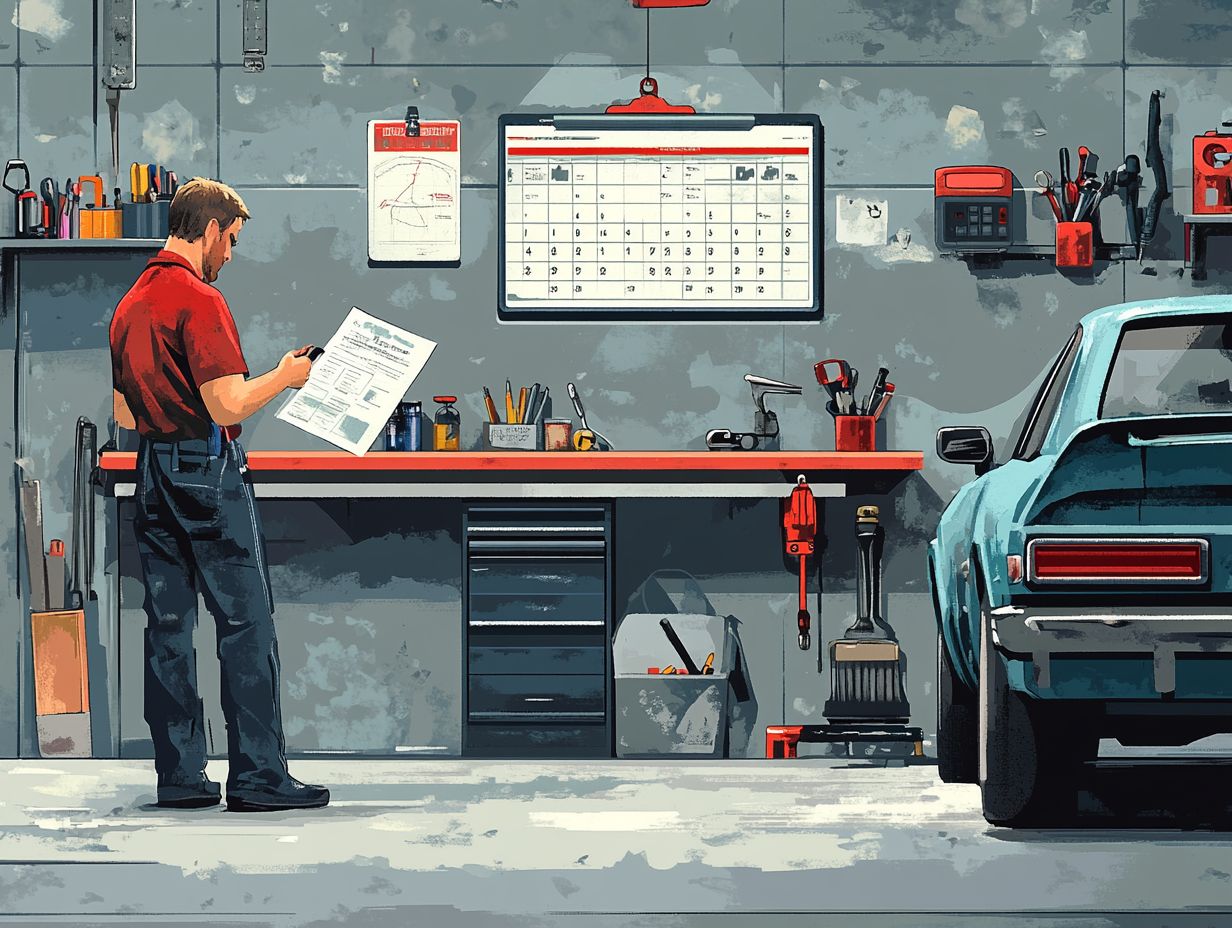Understanding Car Maintenance Plans
A car maintenance plan is an essential tool for anyone looking to keep their vehicle in top shape. It helps you avoid surprise repair bills while ensuring your car runs smoothly.
This article covers the basics of these plans. You’ll learn about the differences between manufacturer and aftermarket options, as well as the many benefits they offer.
You’ll discover key factors to consider when choosing a plan. We also provide tips to help you maximize its benefits.
Whether you’re a first-time car owner or a seasoned driver, understanding maintenance plans can enhance your driving experience and protect your investment.
Contents
- Key Takeaways:
- What is a Car Maintenance Plan?
- Types of Car Maintenance Plans
- Benefits of a Car Maintenance Plan
- Factors to Consider When Choosing a Car Maintenance Plan
- How to Make the Most of Your Car Maintenance Plan
- Frequently Asked Questions
- What is a car maintenance plan?
- Why is it important to have a car maintenance plan?
- How does a car maintenance plan work?
- What is typically covered in a car maintenance plan?
- Are all car maintenance plans the same?
- Do I still need to follow my car’s recommended maintenance schedule if I have a maintenance plan?
Key Takeaways:

- A car maintenance plan covers regular maintenance and repairs, saving you money and providing convenience.
- There are two types: Manufacturer Plans from car companies and Aftermarket Plans from third-party providers. Each has its own advantages.
- When choosing a plan, consider coverage, cost, and the provider’s reputation. Assess your needs to find the best fit for your vehicle and budget.
What is a Car Maintenance Plan?
A car maintenance plan is your strategic ally in vehicle care, providing a structured way to manage maintenance tasks and costs while also understanding your car’s warranty and maintenance.
This plan typically includes regular oil changes and tire rotations to keep your vehicle in optimal condition.
By opting for a prepaid service plan from trusted providers like MotorHappy, you gain peace of mind knowing your maintenance needs are covered without worrying about fluctuating service costs.
Definition and Purpose
The purpose of a car maintenance plan is to guide you in caring for your vehicle. It ensures essential tasks are done on time and efficiently.
This organized approach helps keep your vehicle in peak condition, reducing long-term costs and enhancing its longevity.
By establishing a routine with regular inspections, oil changes, tire rotations, and brake checks, you can avoid unexpected breakdowns.
Service departments are key in implementing these plans, offering reminders and scheduling options. This makes managing routine tasks easier and helps you keep a reliable history of your vehicle s health, enabling informed decisions about repairs.
Sticking to a structured maintenance plan builds responsibility and care for your vehicle, ensuring it remains safe and dependable on the road.
Types of Car Maintenance Plans
You ll find two main types of car maintenance plans: Manufacturer Plans and Aftermarket Plans, each with unique coverage options.
Manufacturer Plans, offered by brands like Audi, Lexus, Mazda, Toyota, and Volkswagen, ensure maintenance meets the manufacturer’s guidelines. Aftermarket Plans provide flexibility, allowing you to choose service options that suit your needs.
Manufacturer Plans vs. Aftermarket Plans

Manufacturer Plans and Aftermarket Plans differ in their service contracts. This affects how you maintain your vehicle.
Manufacturer Plans give you access to authorized dealerships. These dealers use the original parts made by the car’s manufacturer (OEM), following factory specifications.
Aftermarket Plans are more appealing if you want budget-friendly options. They offer a wider range of services and compatibility with different providers.
This distinction is essential in determining which plan best fits your individual vehicle requirements.
That said, consider potential drawbacks, such as varying coverage limits and challenges in finding qualified technicians. Weigh your needs, vehicle age, and financial goals to choose the right plan.
Benefits of a Car Maintenance Plan
A Car Maintenance Plan presents you with a host of advantages, including substantial cost savings and the convenience of managing maintenance tasks effortlessly.
The organized framework of these plans allows you to budget effectively for your vehicle’s needs. You can plan for essential services, such as oil changes and tire rotations, while eliminating concerns about unpredictable fees.
Cost Savings and Convenience
The cost savings and convenience tied to a Car Maintenance Plan make it an appealing choice for vehicle owners like you. By choosing a prepaid maintenance plan, you lock in services at fixed rates, removing the uncertainty of fluctuating maintenance costs.
This structured payment system allows you to spread expenses evenly over time, making budgeting simpler without the stress of unexpected costs. With streamlined scheduling, you can arrange routine tasks like oil changes, tire rotations, and inspections at your convenience.
This proactive approach not only keeps your vehicle performing at its best but also extends its lifespan. Ultimately, it leads to reduced long-term ownership costs. For those of you navigating busy schedules, the combination of fixed payments and effortless appointments can transform your experience.
Factors to Consider When Choosing a Car Maintenance Plan
When choosing a Car Maintenance Plan, it s essential to weigh various factors, such as coverage level, associated costs, and the reputation of the service department offering the plan.
Plans can differ significantly in the scope of maintenance they cover. It s vital to understand what s included like oil changes, tire rotations, and replacements to ensure you re getting the best value for your investment.
Coverage, Cost, and Reputation

Understanding coverage, cost, and reputation is essential for making informed decisions about a Car Maintenance Plan. These factors directly impact your overall vehicle maintenance experience.
When assessing coverage, consider the specific services included. Some plans might cover routine maintenance like oil changes, while others may extend to more extensive repairs.
Cost is another crucial factor not just the upfront price, but also the potential long-term savings that come with comprehensive coverage.
To gauge the reputation of a service provider, look at customer reviews and industry ratings. These can provide valuable insights into reliability and quality.
By carefully analyzing these aspects, you can identify the ideal Car Maintenance Plan, leading to peace of mind and enhanced vehicle longevity.
How to Make the Most of Your Car Maintenance Plan
To truly reap the rewards of your Car Maintenance Plan, it’s crucial to adopt strategies that enhance its benefits while steering clear of common pitfalls that could result in poor vehicle care.
This entails diligently following the scheduled servicing recommendations, which means regular check-ups as advised by your vehicle s manufacturer, proactively tackling maintenance tasks, and engaging in clear communication with your service manager to ensure every aspect of your vehicle s needs is comprehensively addressed.
Tips for Maximizing Benefits and Avoiding Pitfalls
Maximizing the benefits of your Car Maintenance Plan requires you to stick to scheduled servicing and routine maintenance tasks while also maintaining clear communication with the service department. By gaining a thorough understanding of your maintenance coverage and the specifics of each service, you can sidestep unnecessary expenses and keep your vehicle in prime condition.
To elevate your communication with the service team, jot down your vehicle’s performance issues or concerns ahead of time. This preparation can lead to more meaningful and productive discussions.
Keep a maintenance log! It s a game-changer for tracking your car s care, helping you note what has been done and when, ensuring that nothing slips through the cracks.
Setting reminders for upcoming services can also keep you ahead of the game, helping you avoid oversights that could escalate into larger problems later.
Finally, familiarize yourself with the specific warranties and coverage details of your plan. This knowledge enables you to address any uncertainties during service consultations, giving you peace of mind.
Assessing Your Needs and Options
Assessing your needs and options is essential when selecting a Car Maintenance Plan. This process allows you to align your vehicle care goals with the right service plan. Consider factors such as your driving habits, the specific maintenance tasks your vehicle requires, and whether additional coverage from insurance agencies would benefit you.
By thoroughly evaluating your personal driving habits like how frequently you use your vehicle, the typical driving conditions, and the distances you travel you can gain valuable insights into how often your vehicle may need servicing.
It’s also crucial to factor in the age of your vehicle; older cars generally have different maintenance needs compared to newer models. Understanding these specific requirements, such as oil changes, tire rotations, and brake inspections, will guide you in selecting a plan that includes all the necessary services.
Ultimately, knowing what each option covers will enable you to make informed choices, ensuring your vehicle receives the care it deserves and remains in optimal condition.
Frequently Asked Questions

What is a car maintenance plan?
A car maintenance plan is a service contract that covers the cost of regular maintenance and repairs for your vehicle. For comprehensive coverage, understanding what you need to know about car maintenance insurance is essential. It typically includes scheduled oil changes, tire rotations, and other recommended maintenance tasks to keep your car running smoothly.
Why is it important to have a car maintenance plan?
A car maintenance plan is important because it helps you stay on top of your vehicle’s maintenance needs and can save you money in the long run. Regularly scheduled maintenance can also extend the life of your car and prevent major breakdowns.
How does a car maintenance plan work?
When you purchase a car maintenance plan, you pay a set amount upfront for a certain number of years or miles. During that time, you can take your car to an approved service center for covered maintenance and repairs, without having to pay out of pocket.
What is typically covered in a car maintenance plan?
A car maintenance plan usually covers routine maintenance tasks such as oil changes, filter replacements, and tire rotations. To ensure you’re on track, consider understanding your car’s maintenance schedule, as some plans may also include coverage for major repairs, such as engine or transmission issues.
Are all car maintenance plans the same?
No, car maintenance plans can vary depending on the provider and the type of plan you choose. Some plans may cover more services or have longer coverage periods than others. It’s important to carefully review the details of a plan before purchasing it.
Ready to get started? Contact your service provider today or check your vehicle s maintenance schedule!
Do I still need to follow my car’s recommended maintenance schedule if I have a maintenance plan?
Absolutely! Following your car’s recommended care schedule is key.
It keeps your vehicle in top shape and ensures that your maintenance plan stays valid.






